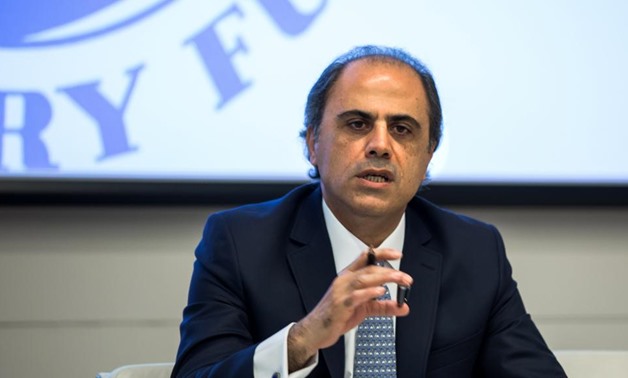
Jihad Azour, the director of the IMF’s Menap area, was a former Lebanese finance minister. Victor Besa for The National - REUTERS
CAIRO – 20 April 2018: International Monetary Fund Director of the Middle East and Central Asia Department Jihad Azour stated Friday that the Egyptian economy has witnessed a “palpable improvement” in the flow of capital and in terms of foreign currencies reserves to Egypt Today.
Azour’s statements came during a press conference at the IMF’s headquarters in Washington DC, U.S., during which, he also affirmed that the tourism sector and exports have also improved.
“The Egyptian government will focus in the coming period on rejuvenating economic growth and raising employment,” Azour mentioned, explaining that some 700,000 Egyptian youth join the job market in Egypt annually.
In a
with Egypt Today, Azour was asked at what growth rate would improvement be felt by the citizens, to which he replied that “based on studies and statistics, if the growth rate exceeds between 5.5 percent and 6 percent per year, there will be more stability in the labor market and a gradual decline in unemployment rates and that’s required to have growth felt by citizens.”
During the interview, Azour praised Egypt’s progress in the reform process affirming that the “first phase of economic reforms was successful and the authorities managed to achieve stability by gradually reducing the level of inflation and regaining confidence.”
This was translated into massive capital inflows and recovery in some key sectors such as export and tourism, he added.
Azour stated in February that Cairo would receive a $2 billion fourth tranche of its $12 billion loan from the International Monetary Fund’s (IMF) after concluding the program’s third review in June.
“The next review is expected to be completed in June, some weeks after the associated mission visits Cairo. The fourth tranche for the amount of $2 billion will be disbursed upon the completion of the review by the IMF Executive Board,” Azour said.
The IMF Executive Board approved in November 2016 a three-year Extended Fund Facility (EFT) loan to Egypt worth $12 billion to support its economic reform program.
In December 2017, Cairo received the third $2 billion tranche of its loan, bringing total disbursements to $6.08 billion.
When asked about suggestions to Egypt’s government to avert a possible increase in its budget deficit given the recent jump in global oil prices, Azour said: “An objective of the authorities’ reform plan is to eliminate all fuel subsidies except for LPG by fiscal year 2018/19. This will shield the budget from fluctuations in oil prices and protect social spending.”
Egypt’s budget deficit for the 2017/18 fiscal year is expected to reach 9.4 percent of gross domestic product (GDP), up from previous projections of about nine percent, deputy finance minister Mohamed Meait told Reuters in January.
Meait attributed the rise to the increase in global oil prices and high local interest rates.
Speaking on the IMF efforts to help Egypt’s government’s boost its revenues, Azour said that the Fund has “a long-standing engagement with Egypt for both tax policy and tax administration and on a broad range of issues to increase tax revenues.”
He explained that the fund provided support with the implementation of the VAT (value-added tax) in areas such as legislation and design. Azour added that the fund also provided advice on strengthening tax return filing and payment through the implementation of new procedures.
“We are also assisting the government in assessing issues in Egypt’s international tax rules, which aim to strike a balance between attracting foreign direct investment and safeguarding revenue received from international businesses by limiting tax avoidance through international tax planning,” he concluded.
Additional reporting by Yasmine Samra.

Comments
Leave a Comment